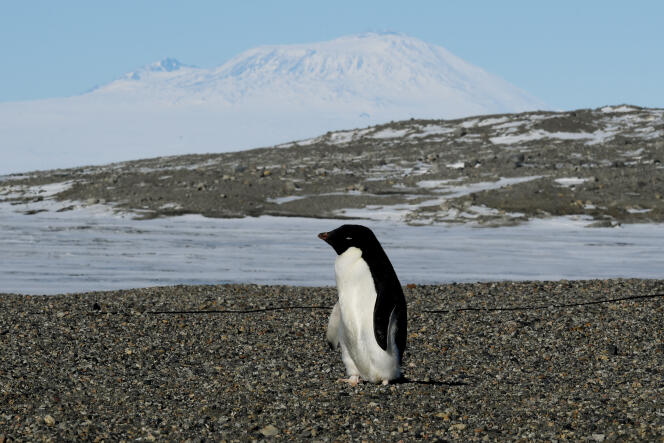
Non-human primates are not the only animals whose past can be explored by the techniques developed by archaeology. Even if they do not make and use tools that endure over the eons, certain species leave traces that are archives waiting to be deciphered.
Arriving in Antarctica in the early 1990s, Steven Emslie was immediately struck by the mounds of pebbles amassed by Adélie penguins in abandoned colonies. "I have a background in archaeology, so I looked at these mounds as an archaeologist would look at a cultural site," said the researcher, now a professor of marine biology at the University of North Carolina in Wilmington. "I wanted to know if they contained preserved bones and other tissues that could be analyzed across time, and it turned out they did."
This led to the birth of his project on the "paleoecology of penguins," which is still going on today. In fact, he just returned a few days ago from a mission in Antarctica. The objective is to use various archaeological methods to describe the animals' past and the evolution of the ecosystem in which they lived.
Emslie "applied these methods to dig into the mounds and recover organic remains, including penguin prey, fish bones, otoliths and squid 'beaks.' [He uses] radiocarbon dating to determine the history of past penguin occupation." "I am now using the tissues for stable isotope analysis in order to assess the diet and food hunting locations in the past, especially the modification of these locations with climate change," said the researcher, who is interested in two other species of penguins, the gentoo penguin and the chinstrap penguin, also mummified amidst the guano by the harsh Antarctic conditions.
Dietary change
The first person to have taken an interest in these frozen natural archives was perhaps the Belgian meteorologist Louis Bernacchi. On February 17, 1899, as he was preparing for the onset of winter as part of the first team to winter over in Antarctica, he was struck by the sight of thousands of corpses of young penguins killed by a cold snap on Cape Adare, at the entrance to the Ross Sea, which is still home to the largest colony of Adélie penguins today. "Thousands of years hence, if the species should become extinct, these remains frozen and buried among the debris will be available as a proof of what once existed in these gelid regions," he wrote in his journal.
Just over a century later, in 2014, Emslie and his colleagues paid tribute to Bernacchi in a Quaternary International article reviewing the accumulated results in penguin paleoecology. Indeed, "ornithogenic soils" allow us to go back hundreds, even thousands of years into the past. Evidence from these soils supports the hypothesis of a likely krill surplus generated by whale and seal hunting since the 18th century.
You have 43.02% of this article left to read. The rest is for subscribers only.